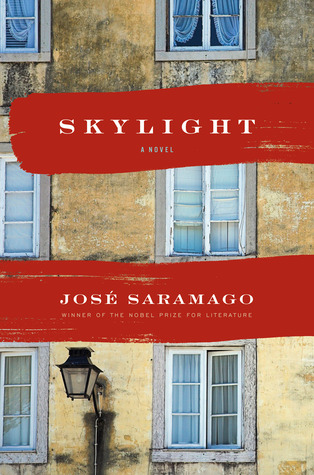 Character-driven novels are intrinsically hard to review. There's no strong central plot drawing them forward, and without a strong central plot it's a little hard to convey what a book is actually about. In this case, it's particularly hard for me, because I haven't read any of Saramago's other work. The guy won a Nobel Prize for literature; there's obviously something big and compelling his writing, but I just didn't see that, and I feel like that means I missed something.
Character-driven novels are intrinsically hard to review. There's no strong central plot drawing them forward, and without a strong central plot it's a little hard to convey what a book is actually about. In this case, it's particularly hard for me, because I haven't read any of Saramago's other work. The guy won a Nobel Prize for literature; there's obviously something big and compelling his writing, but I just didn't see that, and I feel like that means I missed something.
Now, part of that could easily be because Skylight is some of Saramago's early work, and consequently his writing isn't fully polished and hasn't completely developed into what it would presumably become later. In the introduction, it's noted that many of the threads of story found in Skylight can be found in more fully-developed forms in works composed later in Saramago's career. Maybe I should have read some of those first, so that I could make an apt comparison. However, I didn't, and so here we are.
Skylight's main characters all inhabit the same apartment building in Lisbon, Portugal, in 1952. The building is divided into six different apartments, and each apartment contains its own inhabitants with their own problems, though they are all intricately woven through each other. Cobbler-philosopher Silvestre and his wife take in a boarder named Abel who is hoarding experience in life, but without a real purpose. Across the hallway live Emilio and Carmen, Emilio's Spanish wife who raises hell because she feels trapped in her marriage. On the second floor, a former prostitute named Lidia is now the mistress of a businessman, and across the way Justina deals with her womanizing husband. On the third floor, a young woman gets a new job for Lidia's paramour, but the position only causes tension in the building, and a pair of sisters keep secrets from their mother and their aunt.
The book flap calls Saramago "the master of the quotidian," and indeed he does seem to have a wonderful way of capturing the everyday lives of his characters. Without having a strong central plot, Saramago still manages to have a steady building of tension that leads up to a climax. However, the novel seems to end abruptly, without several of the plot lines fully resolved. While some of them are left open-ended but with a satisfying drop-off point, others are just...left. Justina and Claudhina's plots are the most obvious examples of this. I didn't feel like there was any indication of how those plots were supposed to go beyond the pages of the book. I also didn't really feel drawn to Silvestre; his plots and character started off well, but as soon as he became a philosopher in addition to a cobbler, he lost a lot of my interest. His ramblings to and with Abel about purpose and love and blah blah blah bored me, and it felt very much like Saramago was just preaching his own philosophy. I don't mind when books have a message woven in, but I prefer it when it's done subtly, rather than it being repeatedly shoved in my face.
Still, overall, this was a lovely work of character and I enjoyed it.
3.5 stars out of 5. (I feel terrible saying that. This guy won a Nobel Prize and here I am giving it 3.5 stars. Oh dear god, what have I done...not that it really does anything, but still.)
No comments:
Post a Comment